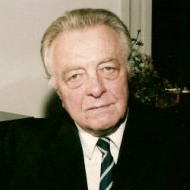Ilja Hurnik was well known in musical circles as a composer and pianist. He has also made a name for himself as a teacher and popularizer of classical music. Together with Petr Eben he had created a Czech version of Carl Orff's Schullwerk. In addition he wrote books, librettos and lyrics. Being equally enthusiastic about all these fields earned him a reputation of a Renaissance personality.
Ilja Hurnik acquired the rudiments in music in his home town where from 1930-1938 he learned to play the piano and later composition with Frantisek Mita Hradil. He continued his piano lessons with Vilem Kurz in Prague, where he also attended Ilona Stepanova-Kurzova's class at the Conservatoire Master School. Under Ilona Stepanova-Kurzova's guidance he perfected his piano accomplishments at the Prague Academy of Arts, having already been initiated into the principles of composition under Vitezslav Novak (1941-1944).
As a pianist he became an authority on Leos Janacek. No doubt this stemmed from a natural bent, a kindred spirit with the composer from the same region and Ilja Hurnik's profound awareness of the local folk scene. French impressionism, in particular the works of Debussy is another domain of his. Since the sixties Hurnik has made frequent concert appearances and later began to make records of pieces for four hands partnered by Pavel Stepan and Jana Hurnikova.
As a teacher he was active at the Academy of Arts in Bratislava, Slovakia, (1974-1979), and for many years (since 1970) he had been teaching at the Prague Conservatoire, where he had tutored a number of promising pianists and composers. Hurnik's fiction deals with music themes. The books enjoyed great popularity thanks to the author's wit, fertile imagination and his intimate knowledge of the world of music also behind the scenes. He wrote several collections of stories such as "The Trumpeters of Jericho" (three editions by Supraphon, the last one by Melantrich), "Musical Sherlock" (ed. by Czechoslovak writer in 1971), his last book was memoirs titled "The Closing Message" (ed. Karolinum 2000). Some of his writings have been adapted for the radio as plays, others have formed the bases of opera librettos and screenplays. "The Moths", one of his radio plays, dramatizes a story of moths feeding on piano hammer heads covered with felt.
Nevertheless, composition is the chief aspect of Hurnik's work. When he was only eleven his first pieces for children were issued in print, pieces used as exercises for the learner to this day. Under the influence of his teacher, Vitezslav Novak, and stimulated by his close affinity to the singular personality of his fellow countryman Leos Janacek, Ilja Hurnik developed a heartfelt affection of the language of his native region. This is clearly evident in the pathos imbued heroic ballet "Ondras" and in his robustly humorous cantata "Maryka". The composer liked to revert to old forms as with a slight detachment he creates neo-classical, precise and intelligible compositions. In this connection reference should be made to his "Sonata da Camera", "Esercizii" for wind quartet and "New Clavecin" for piano and strings. As Hurniks composition techniques evolved some new impulses became apparent, for instance in such works as "Moments Musicaux" and "Cyclopes". In taking stock of the genres we may note that Hurnik' s early works concentrated on vocal and instrumental forms. Then, after 1966, when his first opera "The Lady Killers" was completed and staged, his interests turned increasigly to the dramatic. In addition Hurnik had dedicated many of his works to children, inspired by the childhood world while writing to comply with the needs of good young musicians - singers in choir, as well as chamber and orchestral ensembles and instrumental soloists. Ilja Hurnik's many talents are demonstrated in his musical style which shows a thorough command of the craft, a vast amount of experience and an astute vision, sparkling with a wise, ironical philosophy of the world. He viewed the world from a broad angle, aware of the humorous aspects and tending towards the apocryphical. Ilja Hurnik was the intellectual type, his spontaneous approach, though, is easy to undertand, there is a light simplicity about his music which flows with natural grace. His works had met with official recognition. In 1992, he was awarded the title of Doctor Honoris Causa. There was published a monograph of his life and work by the Masaryk University in Brno ("Ilja Hurnik", 1995). In honour of his personality, his name was given to asteroid No.16929-1998 FP73. The most prized reward for him, however, was the permanent appreciation he enjoyed among the general public and professionals alike.

